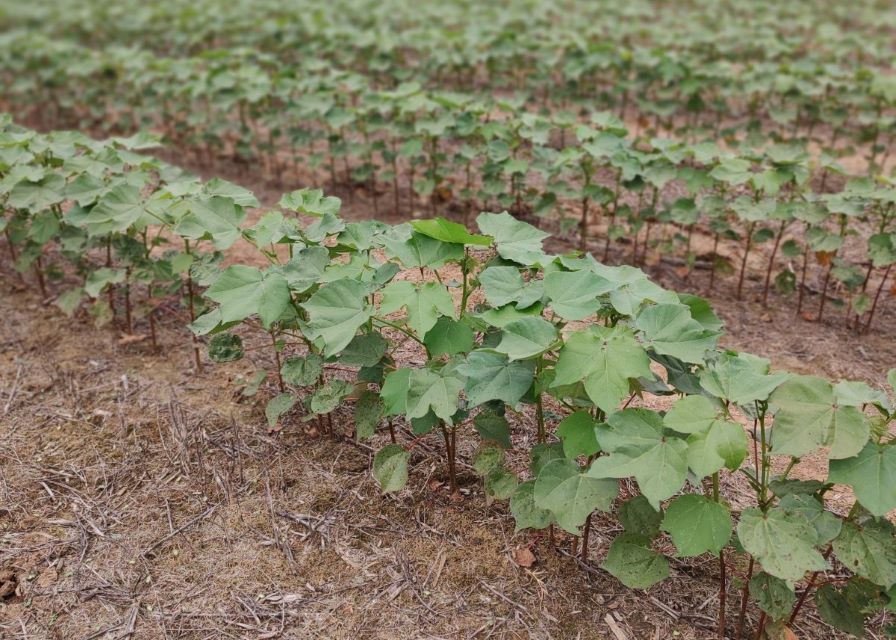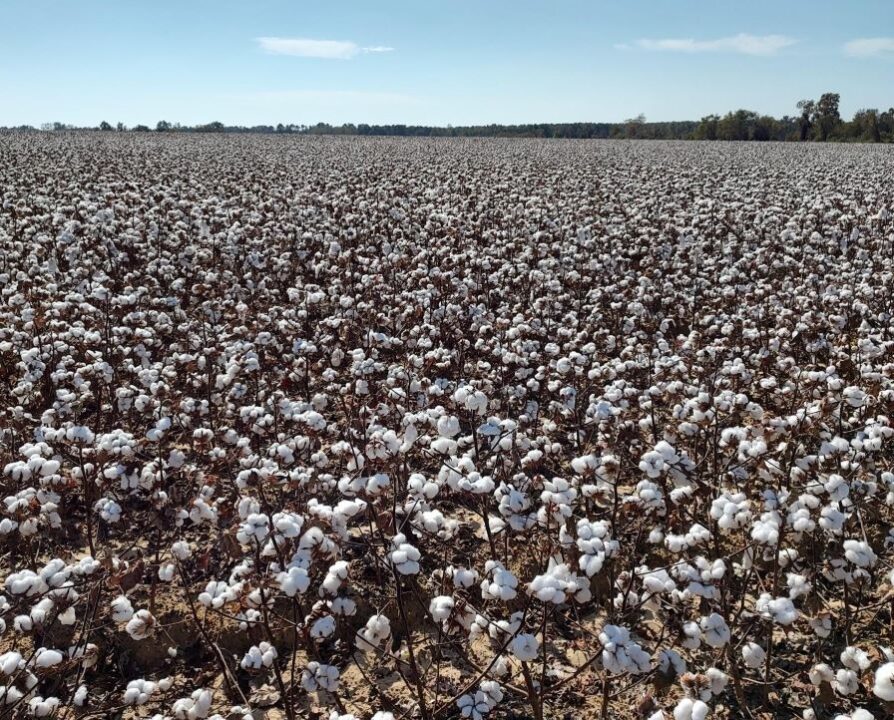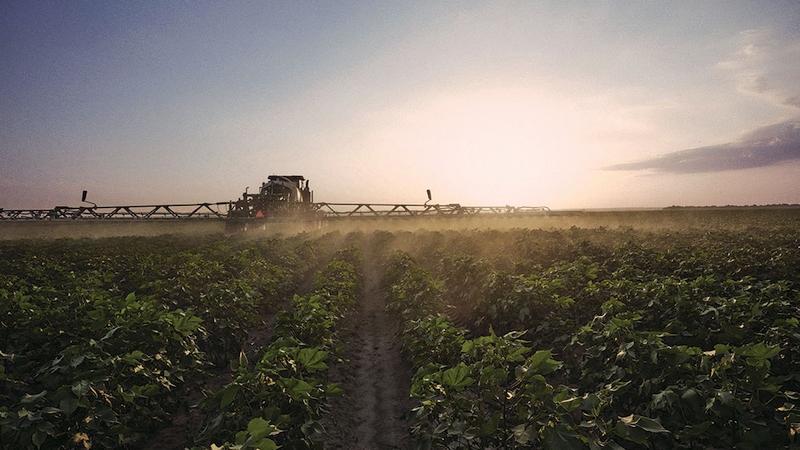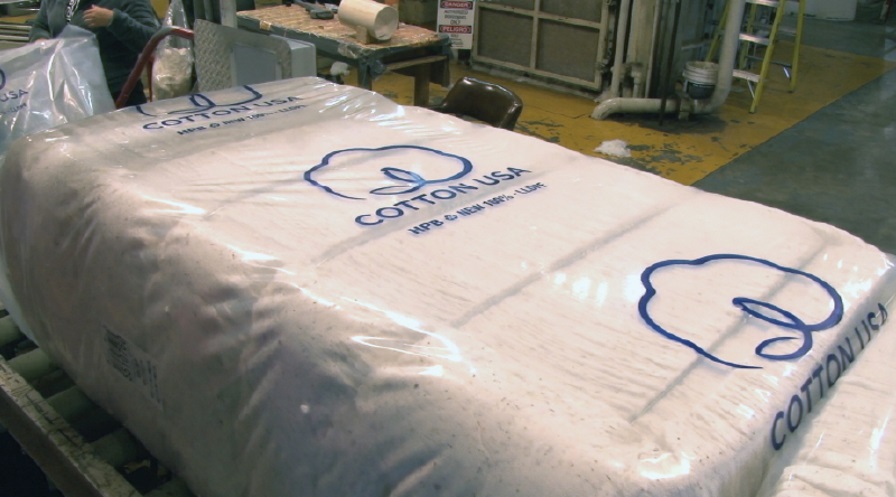Company Speak
Delta and Pine Land Co.
Deltapine
Delta and Pine Land (D&PL) has new Bollgard II with Roundup Ready Flex cotton products for 2008 under the Deltapine brand that show promising improvements in both yield and fiber quality potential. These, plus a new Roundup Ready Flex selection demonstrating top-end yields, are the latest additions to the industry-leading lineup, D&PL says.
“We believe these new, top-performing lines are ones cotton producers will want to try in 2008,” says Keylon Gholston, cotton product manager for Delta and Pine Land. “They were tested in 2007 on-farm trials and join other popular Deltapine products, like DP 143 B2RF and DP 164 B2RF that combine the newest technology with superior genetics, to form our 2008 commercial offerings.”
The new Deltapine cotton products in 2008 are:
• DP 141 B2RF: “Based on preliminary data, we believe DP 141 B2RF to hold excellent yield potential,” says Gholston. “In some cases, it has demonstrated the ability to hang with DP 555 BG/RR in yields. In the mid to south in the Delta region, for instance, this product has demonstrated the potential to deliver high yield and excellent fiber quality.”
• “DP 161 B2RF demonstrated good tolerance to the excessive heat stress cotton suffered during the 2007 growing season,” Gholston continues. “We have many farms where it looks very good yield-wise leading up to harvest. DP 161 B2RF has demonstrated good tolerance to verticillium wilt, which affected many cotton acres in the Texas High Plains during the 2007 growing season.”
• DP 104 B2RF showed excellent resilience in the West Texas weather conditions of 2007. The company says that in High Plains trials, DP 104 B2RF showed the ability to be early maturing without being too determinate.
• Testing in 2006 indicated tolerance to root knot nematodes and a wide adaptation for DP 174 RF. Delta-pine 174 RF has demonstrated outstanding lint yield and very good fiber quality across many growing regions.
“Many fields planted to the new Deltapine products have good fruit sets and we look forward to getting final 2007 harvest data so that we can have a better picture of the strong potential they offer,” adds Gholston. “We suggest producers try a few bags of these exciting new products on their farm in 2008.”
Bayer CropSciences
If Monsanto’s purchase of D&PL was #1 on the Richter Scale, then Bayer CropScience’s acquisition of Stoneville was #1a.
FiberMax
For the ninth consecutive year, Bayer CropScience’s FiberMax increased its percentage of acreage share, moving up 3.1% from last year. In 2006, FiberMax varieties accounted for 26.3% of all acres. Those numbers position FiberMax as the second most planted brand of cottonseed across the Cotton Belt for the fourth consecutive year.
“FiberMax attributes this continued growth directly to providing growers with varieties that consistently deliver yield, quality and profit potential,” says Jeff Brehmer, FiberMax marketing manager. “We truly have varieties that are different for different regions.”
FiberMax varieties have had a near strangle hold on the High Plains of Texas, but Brehmer says several okra-leaf varieties will be a fit in south Texas and the Mid-South, particularly in Louisiana. FM 835LLB2 is a Bollgard II/LibertyLink variety while FM 840B2F is stacked with Bollgard II and Roundup Ready Flex traits. “You have two top-of-the-line varieties with Bollgard II. One is a Flex variety and one has LibertyLink for a weed resistance management alternative,” adds Brehmer.
The biggest hitter on the High Plains for a number of years has been FM 960B2R. It will still be available, but with growing demand for Flex varieties, FM 9063B2F will eventually become its replacement. “As long as there is demand for FM 960B2R in quantities, we’ll keep it,” says Brehmer. “But we’re seeing such a significant demand for Bollgard II/Flex.”
Again on the High Plains, popular vareties are FM 989B2R and FM 9058F. FM 989B2R is a Bollgard II variety stacked with the Roundup Ready trait; FM 9058 is a non-Bt variety with the Roundup Ready Flex trait. A very similar variety to FM 9058F will be available with BGII and Flex in FM 9180B2F.
For the Mid-South, FiberMax varieties with a particularly good fit will be FM 1740B2F and FM 1735LLB2. These two are the newest of what Bayer considers new genetics instead of trait conversions of existing varieties.
“These are what you would expect of Mid-South varieties — a little more growthy, taller,” Brehmer adds.
What a grower says: Monte Ayers of Anton, TX, grew FM 9063B2F this past season, and was a member of FiberMax’s elite “One Ton Club,” which is made up of growers who produced one ton of cotton per acre on a minimum of 20 acres with a FiberMax variety. “I like the compactness of the plant and the earliness,” says Ayers. “If we get the long-staple qualities like its predecessors — FM 989RR, and FM 958LL — it will be a good one.”
Stoneville
Meanwhile, Stoneville also saw record growth, capped by the largest increase in acre share of all cottonseed brands, with a 4% gain. “That tells me growers see the value Stoneville brings to their farm,” says Kyle Maple, Stoneville marketing manager. “One of the key attributes we see is that Stoneville varieties have great early season vigor. They create a rapid stand that ultimately leads to high yields and greater profit potential. That’s a testament to me as to why growers are planting more – it’s making them more money.”
Leading off is ST 4554B2RF – the most widely planted Bollgard II/Flex variety for the past two years, with an 8.14% share of that market in ’07.
“We have five new varieties that we will be advancing as new commercial products for the ’08 season,” Maple continues. “All five come with Roundup Ready Flex and Bollgard II technologies; all are coming out of the same breeding program that created Stoneville ST 4554B2RF.”
“More pounds, high fiber quality, and making growers money.”
Those varieties are ST 4498B2RF, ST 4596B2RF, ST 4678B2RF, ST 5458B2RF, and ST 6315B2RF.
Maple says the addition of Stoneville to the Bayer seed portfolio is “an excellent fit. Bayer CropScience historically has been very, very strong in the Southwest. And if you look east of Texas, Stoneville has a long, storied history. Since 1922, Stoneville brands have been in the marketplace. Growers have trusted the brand. So, you combine the FiberMax and Stoneville brands, backed by Bayer’s commitment to cotton, and that makes for a real nice combination.”
What a grower says: Marty White of Jonesboro, AR, says 2007 has been a tough year, with one 6½-inch rain storm making it difficult to judge anyone’s varieties. But that will not keep him from planting Stoneville varieties in 2008. Up until that rain, White says, “We were happy with them all along. Rain at harvest is making it tough. But I will plant practically all Stoneville varieties again next year. The problems I’m having are weather related — it’s not the varieties.”
Dow AgroSciences
One of the companies that was not involved in the June happenings was Dow AgroSciences with its PhytoGen cotton seed brand.
“While others in the industry have been focused on getting bigger, we’ve been working on getting better,” says Duane Canfield, Dow’s cotton marketing specialist for PhytoGen. “In light of the recent mergers in the cotton industry, many growers believe they have limited seed choices. Yield and quality results from PhytoGen cotton seed varieties, however, prove PhytoGen is a viable alternative.
“PhytoGen continues to be an industry leader,” he adds, “offering varieties with superior fiber length, strength, micronaire and consistency. Our proven success with Pima and Acala cotton in the West is the foundation of our development of early and midseason Upland varieties for the South.”
These widely adaptable varieties include PhytoGen PHY 485 WRF, which in 2006 university OVT trials, according to Dow AgroSciences, was consistently one of the best Roundup Ready Flex stacked varieties.
USDA says PhytoGen had the most popular Pima varieties planted in 2007.
“PhytoGen is not only committed to quality variety development. It was the first company to offer an alternative in-plant insect protection trait with two-gene WideStrike,” Canfield says. “This trait provides season long control of yield-robbing lepidopteran pests and is highly competitive with Bollgard II from Monsanto.”
In 2008, PhytoGen will release PHY 375 WRF, its first-ever early season WideStrike, Roundup Ready Flex stacked variety. This is the latest in a portfolio that in 2009 will begin offering a full-season lineup including in-plant technologies. “Growers will have even more choices to battle root-knot nematode, reniform nematode seedling diseases and much more in a few years,” Canfield says.
Another key development in the pipeline is a new generation of herbicide-tolerant traits that Dow AgroSciences plans to bring to market as the best complementary trait to improve and enhance the Roundup Ready technology system. “This new trait will provide tolerance to multiple classes of herbicide chemistry and address the growing number of glyphosate-resistant and other hard-to-control weeds,” continues Canfield. “This new trait is being validated in several crops, including cotton, and will be an excellent companion to our next generation of in-plant insect protection.”
What a grower says: Larron Copeland of Bronwood, GA, began planting PhytoGen varieties three years ago. The first was PSC 355. “That was my favorite dryland conventional variety,” he says. “We had some 1,300-1,400 pound yields with it.”
Dyna-Gro
Dyna-Gro seed is a proprietary seed brand offered by UAP Distribution Inc. and sold to farm customers through UAP Distribution retail locations and it’s dealer network.
Dyna-Gro Seed will continue to sell its current portfolio of cotton lines products of include DG 2100 B2RF, DG 2215 B2RF, DG 2242 B2RF and DG 2520 B2RF, all of which have the BGII/ RR Flex traits. “Bollgard II/Roundup Ready Flex traits have been widely accepted and I would anticipate this going even higher,” says Dyna-Gro’s Seed Production Manager Tommy Killebrew. “Now that the EPA has approved the natural refuge option, of course high yield’s are the ultimate goal and tests have shown the Dyna-Gro brands are among the best.”
For 2008, the company will offer:
• Dyna-Gro 2400 RF is a new release with the Roundup Ready Flex trait. This variety demonstrates an early-medium maturity with a robust growth habit. This variety is broadly adaptable for most of the cotton growing regions and has shown excellent yield potential in areas of Texas where the natural refuge option is not available.
• Dyna-Gro 2490 B2RF is a Bollgard II Roundup Ready Flex variety early-medium maturity plant that adapts well in many growing conditions and soils. Limited data shows it to excel on sandier soils.
• Dyna-Gro 2570 B2RF is a new release for 2008 and has the Bollgard II Roundup Ready Flex traits. This medium maturity plant adapts well to various growing conditions and lighter soils. This smooth-leaf variety has a tendency to be a tall plant as associated with robust plant growth. DG 2570 B2RF has excellent seedling vigor and performs well under heat stress and droughty conditions.
Americot
Another company that had a serious market-share bump was Americot in buying the NexGen varieties from Stoneville. In fact, it more than doubled. Combined, Americot goes from a 2.5% market share in 2006, to what would have been a 6% market share in ’07. That share is good enough to make Americot the second largest seed company in the Southwest, and third largest in the country.
“Americot will market two brands in 2008: Americot and NexGen,” says Americot General Manager, Terry Campbell. “Adding NexGen doubled the number of products we now offer growers. The breeding program is extensive! We will be evaluating many, many Bollgard II/Roundup Ready Flex and Roundup Ready Flex cottons for release from 2009 through 2012. The most interesting addition is the conventional germplasm. We have and continue to develop cottons that address local needs of growers in the Southwest, Mid-South and Southeast.”
Americot
After facing several years of extreme drought, the Plains was much wetter that normal and far behind on heat units this past season. “Heat units on the Plains lagged all season, but at the end, yields and quality have been above average,” Campbell continues. “AM 1532 B2RF has always preformed well on irrigated acres; this year many dryland acres were planted to AM 1532 B2RF and timely summer rains have resulted in excellent yields and fiber quality.
Americot made a strong push in the Mid-South and Southeast this past season. “Varieties under the Americot brand are suited for growers’ needs in the Mid-South, Southeast and Southwest regions,” Campbell says. Those will include Bollgard II/Roundup Ready Flex cottons, such as AM 1532 B2RF, AM 1622 B2RF, AM 1664 B2RF and the new AM 1550 B2RF. AM 1550 B2RF, is targeted for the north Mississippi River Delta area.
What a consultant says: “We think (AM 1550 B2RF) is going to be a good early variety for us,” says Lake City, AR, consultant Greg Smith. “It was not hard at all to control; plant height speaking. It looks like it’s going to be a promising variety, and we’ll give it more play according what our gin says. We only had one producer that planted it, due to the limited availability of it, but he was pretty tickled with it. We have no complaints.”
Smith also worked with AM 1532 B2RF and put it to a drastic test – planting it on the heaviest land. “We put it in some pretty tough situations because we wanted to find a Flex variety for our tough gumbo. We felt like that would give us a little more stalk than some other varieties we were growing,” he says. “It yielded about what we expected on gumbo.”
NexGen
As for the acquisition of NexGen, Campbell says NexGen varieties offer Americot the opportunity to address several grower needs in the Southwest – earliness, good yield, storm resistance, and excellent fiber quality.
“(NexGen) NG 3550 RF was planted primarily to dryland production and growers have been impressed with its early season vigor, yields and quality,” Campbell explains. “The NexGen lineup will include NG 3550 RF, NG 1572 RF, NG 3273 B2RF and several new Bollgard II/Roundup Ready Flex and Roundup Ready Flex products. This current NexGen lineup is primarily suited for the Southwest region but we will offer new NexGen cottons east of Texas beginning in 2009.”
Americot worked with NexGen growers and NexGen breeding nurseries across the Southwest this past summer. “We learned one thing – growers sure love their NexGen (varieties),” Campbell says. “For example, we have received many good comments on NG 3550 RF. It has shown excellent early season vigor and looks promising as an irrigated and dryland cotton suited for the southern High Plains in areas where medium-season varieties are preferred.”
For 2008, Americot will offer two new NexGen Bollgard II/Roundup Ready Flex products and three new NexGen Roundup Ready Flex cottons: NG 3348 B2RF and NG 3410 RF, suited for growers in the High Plains region south of Plainview, the Rolling Plains and southwestern Oklahoma. NG 2549 B2RF is for High Plains production, especially in the areas north of Lubbock. NG 1551 RF and NG 1556 are better suited to the northern production areas of the High Plains, northern Oklahoma and Kansas, or in any situation where the growing season is limited.
What a consultant says: Of the NexGen varieties, Amarillo, TX, consultant Justin McGee had more NG 1572 RF (a Roundup Ready Flex cotton) than any other cotton. And the fact that NG 1572 RF is not a Bollgard variety makes it an even better choice in his area. “With our elevation and short growing season, NG 1572 RF fits us real well,” he says. “And we want Flex on 100% of our acres.”
All-Tex Seed Company
All-Tex Seed Co, of Levelland, TX, has been pushing to expand its presence in the seed market since 1974, and is now concentrating on it breeding program.
“We’ve worked hard this past year to expand our breeding program,” says All-Tex general manager Cody Poage. “We just hired another breeder, and we now have two. One here in Levelland and one is in Victoria. And we have three greenhouses. We are heavily invested in our breeding program. We are working on picker varieties that will work on the High Plains of Texas and down into central and south Texas.”
All-Tex has five Bollgard II, Roundup Ready Flex varieties: Summit B2RF (early season), Marathon B2RF (early-medium), Apex B2RF (medium), Titan B2RF (medium), and Arid B2RF (medium). All are smooth-leaf type.
“We are going to try to possibly do some work with other companies other than Monsanto on different technologies,” Poage continues. “Our medium- to long-range goal is to incorporate more picker varieties into our program that will work for the whole State of Texas. Long term, we will have some that will work in the Delta.
New for 2008 will be six Round Up Ready Flex only varieties: ATX 66330 RF, ATX 65333 RF, ATX 65018 RF, ATX 65016 RF, ATX 45015 RF and ATX 45009 RF. ATX 66330 RF and ATX 65333 RF are medium-maturing smooth-leaf varieties, while ATX 65018 RF, ATX 65016 RF and ATX 45015 RF are medium-maturing, semi-smooth-leaf selctions. ATX 45009 RF is an early-medium, semi-smooth-leaf variety.
Also new for 2008 will be the conventional ATX 06102, a medium-early, moderaterly hairy variety.
Croplan Genetics
Croplan Genetics also went through some recent changes.
Winfield Solutions, LLC will be closely aligned with the Land O’Lakes Seed division. The two businesses will leverage combined technical and marketing expertise in the implementation of a collaborative go-to-market strategy under a new WinField Solutions market identity.
“What you will see out of this is a more concerted effort, in terms of Land O’Lakes going to the grower and providing solutions for both the seed and crop-protection needs of our growers – that’s it in a nutshell,” says Dr. Jaime Yanes, Cotton Products Manager for Croplan Genetics, a brand of Winfield Solutions, LLC. “The district managers, who are our salesmen on the seed side, have not changed. You will see a more integrated approach going to the market than what you had in the past.”
Croplan Genetics will offer three established Bollgard II/Roundup Flex varieties in 2008, along with two new varieties – one a Bollgard II/Roundup Ready Flex selection, and another with Flex only.
• CG 3020B2RF – A very early-maturity, smooth-leaf picker variety stacked with Bollgard II/Roundup Ready Flex.
What a grower says: Tracy Griffiths of Whiteface, TX: “I really like the plant vigor of the 3020. With some of the genetics of the new cotton, you don’t get the plant vigor that the older cottons have. The 3020 will push a brick up.”
• CG 3520B2RF – An early-maturity, semi-smooth-leaf picker variety stacked with Bollgard II and Roundup Ready Flex.
• CG 4020B2RF – An early- to mid-maturity, smooth-leaf picker variety stacked with Bollgard II and Roundup Ready Flex
New varieties for 2008, also bred to help U.S. cotton growers market their fiber in base international and high-end domestic markets, include:
• CG 3220B2RF – An early- to mid-maturity, smooth to semi-smooth-leaf picker variety stacked with Bollgard II and Roundup Ready Flex.
• CG 3035RF – An early- to mid-maturity, smooth to semi-smooth-leaf picker variety with Roundup Ready Flex.
Hazera Genetics
Fueled by an idea, Hazera Genetics began the painstaking process of breeding hybrid cotton in 1985. Over the years, thousands of superior Pima, Acala and ELS crosses have been made, all with the goal of developing superior varieties that growers and mills worldwide demand.
The company’s slogan is “It Grows Like Acala, Sells Like Pima.” And the varieties do share characteristics of both Pima and Acala varieties.
Hazera Genetics is one of the world’s leading companies in the field of breeding, production and marketing of hybrid seeds for cotton, other field crops andvegetables, specializing in advanced bio-technological research and development, worldwide distribution and agro-technical support.
Hybrid cottons offered by the company are:
• HA211with Pima-type fiber with a fit in traditional Acala areas.
• HA195, is also has Pima-type fiber for traditional Acala areas. It is 5-7 days later than HA211.
• HA175 is a very early maturity hybrid cotton, suitable for double cropping, late planting and short season conditions like the northern SJV.
Captions:
USDA says Delta and Pine Land remains the nation’s #1 cotton seed company.
Dave Albers
FiberMax and Stoneville, if combined, would have had the largest market share in 2007.
Joachim Schneider (left), Bayer CropScience Head of BioScience, and (right) Jeff Brehmer, FiberMax marketing manager at Bayer’s Annual Press Conference in Monheim, Germany.
Kyle Maple
Although available in limited supply, AM 1550 B2RF appears to have a good Mid-South fit.
Terry Campbell









